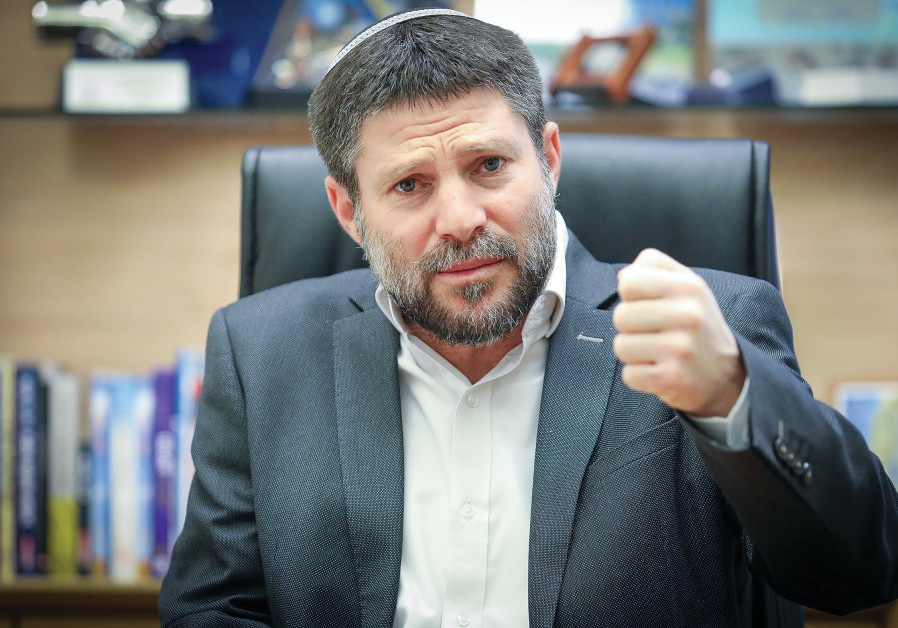
I think that Diaspora Jewry never really had a chance to understand who I really am and what I stand for,” chairman of the Religious Zionist Party MK Bezalel Smotrich passionately tells me this week in his small Knesset office.
The trigger for our heart-to-heart conversation was his recent visit to the UK and France Jewish communities last week. The Board of Deputies (BOD), the umbrella organization that oversees British Jewry, launched an unprecedented attack against Smotrich, calling him a “disgrace” and asking him to never visit the United Kingdom again.
Smotrich (41) is one of the most prominent right-wing leaders in the Israeli political system and is considered to be on the far-Right of the political spectrum.
Smotrich flew to Europe as part of a tour to garner support against some of the government’s religious reforms.
“Get back on the plane Bezalel and be remembered as a disgrace forever,” the Board of Deputies said in a tweet. In a second tweet, in Hebrew, the board said that it rejected Smotrich’s “disgusting ideology that promotes hatred.”

In response, Smotrich tweeted: “British Jews: I love you. All of you.”
Looking back at his visit, Smotrich painfully says, “I wouldn’t want to meet the Smotrich they [UK Board of Deputies] think they know. I have clear conservative and religious positions on issues related to family – that are based on Torah and Halacha. I also think that the whole Land of Israel is for the people of Israel.”
What do you think the “Smotrich” they think they know is like?
“Racist; homophobic; dark. So here’s the deal: I’m not a racist. I have no problem with Gentiles. I have non-Jewish friends here in Israel. The organization that criticized me gives an example to the main problem defining the gap between the State of Israel and the progressive part of Diaspora Jewry. The truth is that the gap is not related to the Western Wall or the conversion laws. There is a complete lack of understanding, a terminological and values gap, between us that will widen as the Israeli society becomes more conservative and Diaspora Jews – mainly progressive Americans – are becoming more and more progressive. They [progressive Jews] don’t know how to defend Israel as the state of the Jewish people; they have a tough time defending Zionism.”
Were you offended by the Board of Deputies tweet?
“I can be offended by justified criticism that is made in a disrespectful manner. Yet I can’t be offended by unjustified criticism made in an unpleasant way. I’m not offended, because it has nothing to do with reality. Many in the State of Israel know me and felt that they (BOD) were demonizing me and what I represent. I’m not racist nor am I homophobic. I have a perception of what is right or healthy for society.”
SMOTRICH FLEW to Europe to meet with rabbis and Orthodox communities in order to discuss issues of religion and state that the current government is promoting, mainly the conversion reform (“even though I rarely leave the country, from ideological values,” he says as a side note).
Yet even though he is officially in a coalition with the World Mizrachi movement in the Zionist institutions, he received serious pushback from the UK-based religious-Zionist organizations.
Mizrachi UK released a statement claiming that it had been “invited to a meeting” with the MK. “We want to make it clear that the meeting should not be interpreted as an endorsement of any of Mr. Smotrich’s previous statements. As a religious-Zionist organization, we reject prejudice of any kind.”
Mizrachi’s local CEO met with Smotrich together with emissaries of Bnei Akiva, its youth movement. Bnei Akiva UK stated that it will continue promoting the “inclusion and acceptance of all, and rejecting all forms of racism, homophobia and hate.”
Ambassador to the UK Tzipi Hotovely probably thinks the exact same way as you do on a majority of topics such as religion and the Israeli-Palestinian conflict. Did she speak out on your behalf? I would assume she has an obligation to criticize large organizations that boycott parliament members from her country.
“She decided not to comment. In communication with Hotovely’s staff, they explained that this is an issue between me and the Jewish community – she didn’t think it was her responsibility to criticize the local Jewish umbrella.
“I think she was wrong. She didn’t fulfill her diplomatic role. When the head of a party in Israel is treated in such a terrible way, I would expect her to defend my right to visit the UK and meet anyone who wants to meet me. I’m not judging her, but I totally disagree with her approach.
“As we speak the Board of Deputies tweeted in support of Health Minister Nitzan Horowitz [chairman of the far-left Meretz Party] for banning ‘conversion therapy.’ I don’t understand how the most, quote, unquote, ‘liberals’ can prevent an adult from going to a treatment of their choice. This is paternalism, totalitarian progressivism.”
Smotrich sees the extreme step that the Board of Deputies took as “great damage to Diaspora Jewry that in the past did not intervene in Israeli politics in order not to be torn from within, but also to maintain the State of Israel as the consensus of the two political camps. Embracing Foreign Minister Yair Lapid and Horowitz, yet boycotting me, not only hurts the relationship but also tears their own community apart.”
Most of the tens of Jewish leaders and rabbis that Smotrich met during his UK visit asked for the meeting not to be mentioned or publicized.
“In France, people were much more open to meet publicly and to take photos,” which he said shows the contrast between the two large yet different Jewish communities. “I met with the chief rabbis of Paris, Marseille and Sarcelles.”
He met with Chabad emissaries and representatives of both European rabbinical umbrella organizations: the Conference of European Rabbis and the Rabbinical Center of Europe. CER president Rabbi Pinchas Goldschmidt attended one of the meetings via Zoom.
Yet Smotrich’s France visit also created controversy. In a tweet from Paris, he wrote: “Two of the community representatives excitedly told me that this was the first time an Israeli had come to them behaving like a Jew,” since he gave a dvar Torah and headed a zimmun (invitation to grace) after the meal.
Deputy chairman of the World Zionist Organization Gael Greenwald, who is considered his political ally, wrote a critical op-ed on the Makor Rishon news site. “A little humility wouldn’t hurt – Smotrich’s tweet that saddened me” is the headline of Greenwald’s piece. Greenwald is a political appointee of the World Mizrachi movement and an oleh from France.
“What lies behind this tweet is a narrow worldview that excludes anyone who does not see the world from a very particular angle,” Greenwald writes. “This tweet seeks to draw a hidden line that defines who is a Jew and who is not a Jew. And by chance, it turned out, a Jew is someone whose lifestyle is the same as Bezalel’s, who lives in a similar locality, educates his children in the same institutions, talks about a weekly Torah portion, who recites the grace after meals and, above all, shares common enemies.”
He concludes with a personal message to Smotrich: “A little humility wouldn’t hurt.”
How can you tweet such a tweet that belittles any other Israeli MKs, leaders or rabbis that ever visited France? This was your first-ever visit to France and the UK. Maybe it would have been better just to listen and less to promote ideology. This tweet creates so much antagonism.
“I don’t agree with Greenwald. Judaism is the Torah that came down from heaven. I tweeted before going to sleep at a very late hour. The subtext was that I wish that the State of Israel would be more Jewish toward Diaspora communities.”
That’s so condescending
“Arrogance can be positive and can be negative. The Torah that Moses received can be arrogant. We put the ‘mezuzah’ outside the entrance to our homes so that the whole world will know that there is Torah here. I feel like the ‘dropout’ rates of young Israelis who grow up in the religious Zionism community and decide to leave it is because there is not enough self-pride. Take a Golani IDF soldier – they have so much pride in their unit. That’s a positive thing.”
SMOTRICH’S FIRST visit to the United States was in 2017 when he participated in a delegation of MKs to Jewish communities on the West Coast organized by the Jewish Federations of North America.
In an interview he gave me after returning to Israel, Smotrich stated that the visit “strongly strengthened me in my opinion that Reform Jews should not be given a foothold in the country. When I see what the Reform movement is doing in the United States – it is killing the Jewish people – I understand what will happen if they come to Israel.”
That said, Smotrich now reveals that the connection to Diaspora Jewry became one of those that are now on his radar.
“I have an excellent relationship with the Jewish Federations of North America, and I even have true dialogue with Reform Jews in the US. Let me just emphasize that my discourse with them doesn’t give them religious legitimacy. As a political leader, I have to meet with them, even though we do not agree on many topics. You’d be surprised, I also know how to listen,” Smotrich smiles.
“I’m not optimistic about the relationship between us, and if nothing will be done in order to intervene, the gaps will deepen.
“My approach is to focus on what we have in common and agree upon. A few years ago we initiated a ‘Jewish Diaspora March’ in Jerusalem, similar to the Israel Day Parade in New York. I also think that the Israeli government needs to create English-speaking schools in Israel for teenagers from the Diaspora, mainly the US, because of the tuition crisis at Jewish day schools.”
He says that in his perspective “dialogue between Israeli and Diaspora Jews that focuses on religion isn’t the right approach.”
So you basically don’t agree with Har Bracha’s Rav Eliezer Melamed, who has been promoting dialogue with the Reform and Conservative movements in the past two years?
“I won’t judge whether it is halachically permissible or forbidden. Yet I think that public discussions about religious practice is a mistake. In this type of dialogue, there will be a nice smile on everyone’s face, but both sides will go home to an unbridgeable gap.”
Can you point out one example of where you went wrong with the Jews of the Diaspora or UK?
“I did not deal with Diaspora issues much till recent years. I grew up as a very provincial Sabra Israeli. I now know that this is an error. The education system in Israel must create meeting opportunities with Diaspora Jews. We need to create an emotional connection like that between siblings. I did not know anything about Diaspora Jews till I participated in the delegation to the US.
“What I have taken upon myself since then is that when a decision I make may impact Diaspora Jews, I initiate dialogue with them and try to take their views into consideration even if I won’t reach an agreement.”
It seems as if you think that you own the whole truth – you can create dialogue but won’t budge on your opinions.
“Listen, there are things I did and said before I entered politics. In 2006 I helped organize a ‘beast parade,’ in opposition to the Jerusalem gay pride parade. That was a mistake. I was 25 years old. It was the first time the pride parade took place in Jerusalem. I felt it hurt the feelings of the residents of Jerusalem, so we created a provocation against what we saw as a provocation. Nobody is perfect.
“Diaspora Jews don’t really know me; they read about me through the Haaretz newspaper’s English edition. That’s not who I am.
“This is the gap between the progressives and me. In the progressive perspective, everything can be true, everything can be good. I don’t live in such a world. The foundation of Judaism is the Torah. In the Torah there is good and evil, distinguishing between sacred and profane.”
At the end of our intense conversation, which was in Hebrew, I told the MK that if he spoke English it would assist his outreach attempts toward Diaspora Jews. Smotrich surprised me and, with the encouragement of his Israeli-American spokesman, switched to English.
“Speaking English is very important not only because the connection between the State of Israel and the Jews of the Diaspora is in English, but since it is an international language,” he says in English with a “not so heavy” Israeli accent. “Unfortunately, I am the product of the classic yeshiva high school in Israel. I need to improve my level of English, and so does our school system.”






